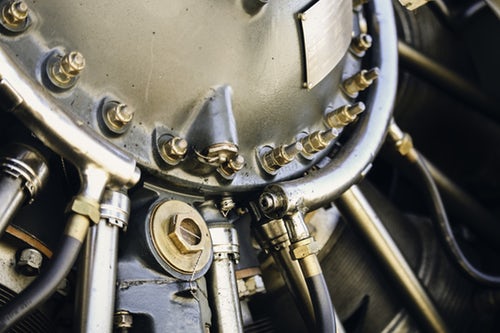Overview
So much of our everyday life is influenced by engineered products. Study your Mechanical Engineering MEng (Hons) degree at ARU and learn to design, develop, operate and manufacture products and parts in our specialist lab whether it is in the manufacturing, the design, or even the materials. Our four-year MEng Mechanical Engineering degree course has been newly reimagined, focusing on project based learning, allowing you to take your in-class theory and apply it in a hands-on project module that will run throughout the year.
Find out more about teaching options and studying during COVID-19 in the Entry requirements section, below.
Engineering is all about taking a product or system and looking at how it can be improved, whether it is in the manufacturing, the design, or even the materials.
On our four-year Mechanical Engineering course, you’ll learn through a wide range of lab sessions. We’ll explore manufacturing, 3D printing, thermodynamics, dynamics, and structural analysis so you can analyse, calculate, model, and experience your proposed concepts. As a part of your project-based learning you will work as part of a team, with students from the different areas of mechanical engineering. This will allow you to develop skills that are invaluable to future employers, including analytical and creative problem-solving skills. You’ll also benefit from dedicated support from our experienced staff, who are experienced industry professionals and expert researchers.
This Mechanical Engineering MEng course differs from the BEng as it has an increased emphasis on project work. You’ll also undertake an integrated Major Group Project in your final year where you’ll look to solve real-world industrial problems and as a result, benefit from working with potential future employers.
You’ll also take an individual research module in Year 3 to boost your self-managed learning and research skills. As a MEng student you’ll develop valuable commercial skills in areas such as marketing, Intellectual Property, team working dynamics, leadership, as well as engineering project management.
Our course leads students through computer based advanced design, simulation and modelling practice in various topics including computational engineering, fluid dynamics, stress analysis, and industrial management. You’ll benefit from using our workshop and laboratory facilities including CAD/CAM and engineering computer modelling centre, industrial-scale CNC milling and lathe machines, metal and plastic rapid prototyping machines, scanning electronic microscope, Instron bi-axial fatigue-testing machine, tensile-testing machine, material-preparation facilities, welding equipment, electronic testing and measuring equipment such as oscilloscopes and signal generating and testing facilities, wind tunnel, air compressors, steam engine and many more laboratory facilities used during course and in individual and group major projects.
Like our BEng course, our MEng is accredited by both the IMechE and IET, meaning that our course has been approved by a professional body as meeting their level of requirements
So what is the difference between a BEng and an MEng course?
A BEng course will enable to you apply for Incorporated Engineer (IEng) status at the end of your course. To apply for Chartered Engineer (CEng) status you will also need to complete a Masters degree.
A four-year MEng course is a three-year undergraduate degree with a one-year asters degree in one course. On completing an MEng course you are able to apply directly for CEng status.
Students completing an IMechE accredited degree are deemed to have met, part or all, of the academic requirements for registration as a Chartered or Incorporated Engineer and are in a strong position to move on to achieve professional engineering status after a period of initial professional development in industry.
January intake students will complete Year 1 between January and August (Trimester 2 & 3), however, Year 2 and 3 will be completed during trimester 1 & 2 between September and May. This means January intake students will only take a one-month summer break in Year 1 and will start Year 2 in September the same year they started the course. Therefore students are expected to graduate this MEng course in 3.5 years.
Careers
Mechanical engineering is possibly the most enabling discipline in engineering, dealing with materials, static and dynamic analysis, structural design, renewable energies, thermal engineering, product quality assurance, and manufacturing.
You’ll have the opportunity to work in industries such as aerospace, automotive, medical, renewable energies, 3D printing, and almost any product development and product-related application.
We work with employers to make sure you graduate with the knowledge, skills and abilities they need. They help us review what we teach and how we teach it – and they offer hands-on, practical opportunities to learn through work-based projects, internships or placements.
In addition to our links with industry, our Employability Service and Placements Team provide numerous opportunities to gain experience and employment through internships and career fairs. You can also take advantage of mentoring schemes, CV and interview preparation sessions.
Where you’ll study
Your faculty
The Faculty of Science & Engineering is one of the largest of the four faculties at Anglia Ruskin University. Whether you choose to study with us full-time or part-time, on campus or at a distance, there’s an option whatever your level – from a foundation degree, BSc, MSc, PhD or professional doctorate.
Whichever course you pick, you’ll gain the theory and practical skills needed to progress with confidence. Join us and you could find yourself learning in the very latest laboratories or on field trips or work placements with well-known and respected companies. You may even have the opportunity to study abroad.
Everything we do in the faculty has a singular purpose: to provide a world-class environment to create, share and advance knowledge in science, technology and engineering fields. This is key to all of our futures.




















